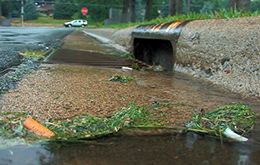Clean Water Current
NACWA Legal Advocacy Ramps Up on Stormwater
 The NACWA Board recently approved the filing of a joint amicus curiae brief in cooperation with The Wet Weather Partnership, to provide an important national perspective for issues crucial to municipal separate stormwater systems (MS4s).
The NACWA Board recently approved the filing of a joint amicus curiae brief in cooperation with The Wet Weather Partnership, to provide an important national perspective for issues crucial to municipal separate stormwater systems (MS4s).
In April 2016, EPA issued a general National Pollutant Discharge Elimination System (NPDES) permit for small MS4s in Massachusetts with an effective date of July 2017. Several interested parties representing the municipal sector filed an appeal in the U.S. Court of Appeals for the First Circuit. At the same time, an appeal was also filed in the U.S. Court of Appeals for the D.C. Circuit. The appeals have now been consolidated in the D.C. Circuit.
The permit requires strict compliance with water quality standards (WQS), and imposes specific obligations on MS4s to meet this requirement. These provisions represent a significant shift from the Clean Water Act (CWA) mandate that MS4s reduce the discharge of pollutants to the “the maximum extent practicable” (MEP), through the implementation of best management practices. Instead, the permit includes compliance with WQS as an additional obligation, and prescribes measures that MS4s must follow to comply with the permit. NACWA has a long history of defending the MEP standard in litigation as the appropriate standard for MS4 compliance, dating back to the 1990s, and the forthcoming court of appeals’ decision will squarely address the extent and limits of federal CWA authority on this issue.
The permit also imposes a requirement on regulated MS4s to impose a numeric flow related (retention) standard on new development and redevelopment within their communities. In Virginia DOT & Fairfax County v. EPA, a federal district court held that EPA does not have authority to regulate flow in a total maximum daily load (TMDL), because it is not a pollutant. This new case represents the first time that a federal court of appeals will address the issue.
The filing deadline for NACWA’s brief is May 15. NACWA will keep the membership updated on developments in the case as they occur.